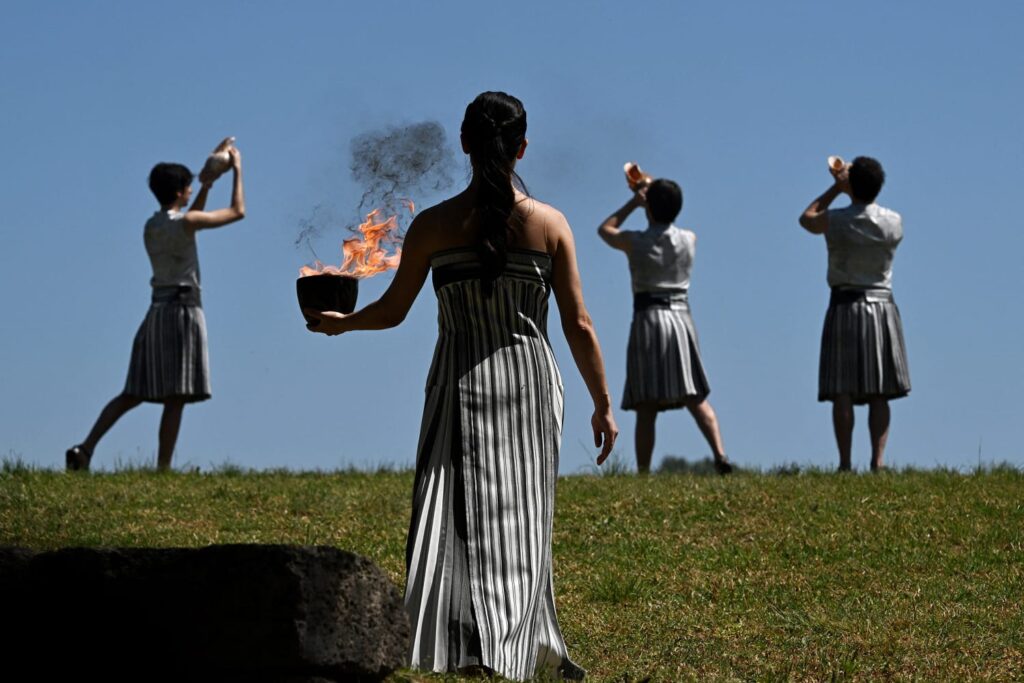On Tuesday, the Olympic flame will be lit in Greece, the birthplace of the Olympic Games, in a ceremony rich in ancient tradition, starting a torch relay that will culminate in Paris on July 26.
The torch will be lit at the site of ancient Olympia and transported more than 3,000 miles to the French capital this summer.
In ancient times, the sacred flame was lit by the energy of the sun and kept lit in the sanctuary of Olympia, known as the Prytaneum.
According to ancient custom, the “high priest” actor Mary Mina asked the sun god Apollo for help in lighting a fire in the ruins of the temple of Hera, wife of Zeus and queen of the gods.
Organizers say the message remains the same.
“The Olympic flame has been a symbol of peace and friendship between nations since ancient times,” the International Olympic Committee said.
The ceremony was planned to use a parabolic mirror to capture the sun's rays. Cloudy skies forced Tuesday's ceremony to use Plan B, a pre-lit flame without relying on God. Organizers will be hoping this is their final plan B.
Although it reflects a Greek tradition dating back thousands of years, the ceremony was first performed in its current form in 1936, when the Olympics were held in Berlin under the watchful eye of Adolf Hitler.
But the action is now performed by actors, while a dance troupe performs choreography “inspired by ancient times,” the IOC said.
The fire-guarding priestess known as Hestiada carries the torch in a vase to the ancient stadium of Olympia, where she hands it to the first torchbearer along with an olive branch symbolizing peace.
The first torchbearer will be Olympic rowing champion Stefanos Ntouskos, who will receive the torch at the edge of the ancient Olympic stadium and begin the relay across Greece.
It will then be handed over to Paris organizers in Athens later this month, before departing for France on the three-masted ship Belem.
The Olympic torch will arrive in the Mediterranean port city of Marseille on May 8, with up to 150,000 people expected to attend the ceremony before the French leg of the relay begins.
Marseille was founded around 600 BC by Greek settlers from Phocaea and hosts sailing competitions.
France's torch relay will last 68 days, culminating in the lighting of the torch at the Olympic Opening Ceremony on July 26.
The ancient game dates back to 776 BC and was extremely popular until it was banned by Christian Emperor Theodosius I in 393 AD. Pope Theodosius I considered the whole business to be part of a pagan cult.
Many of today's flamboyant events were not held back then. For example, there was no torch relay. Olympians at that time had to perform naked. Wrestling is still an Olympic sport, but competitors are no longer smeared with olive oil.
War did not get in the way, as it did when the Persians invaded in 480 B.C., but Greek city-states had a hard time recruiting soldiers, as many city-states were eager to attend and participate in the games. Did.
At that time, women were not allowed to participate or participate in competitions. The enterprising Spartan princess Kiniska took advantage of a loophole to claim the Victory Wreath in 396 BC and since she was the owner of the Victorious Chariot in 392 BC.
These days, too many false starts could result in a runner being disqualified, and in ancient Greece, they could be subject to corporal punishment.

